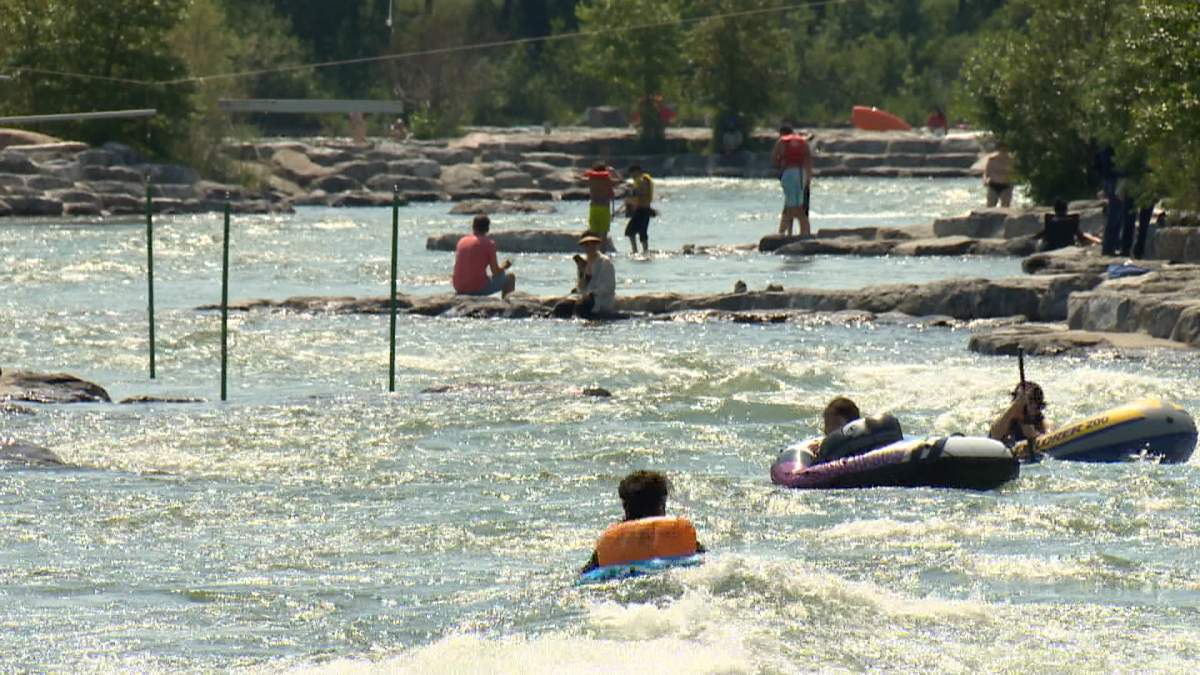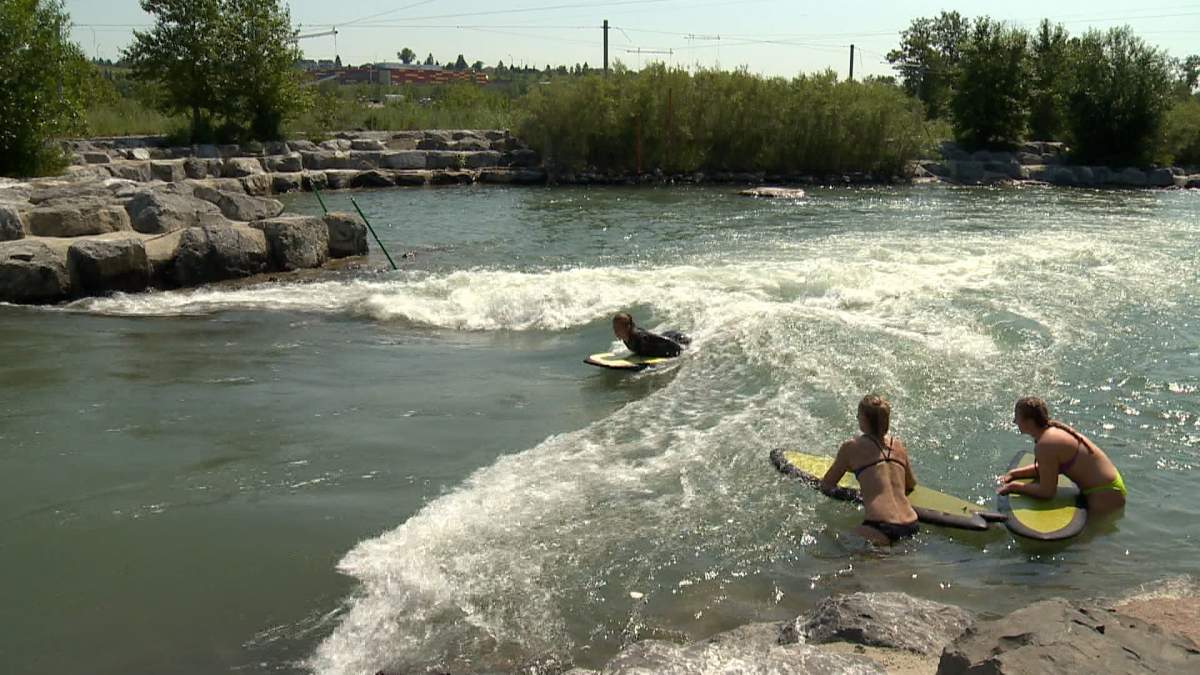While temperatures in much of Alberta were expected to cool slightly compared with a day earlier, the entire province remained under a heat warning on Thursday morning.

Wednesday proved to be a scorching hot day as meteorologists predicted, and Environment and Climate Change Canada says preliminary data indicates 29 areas in Alberta broke records for warmest temperatures ever recorded on July 10.
You can view the temperatures reached in all 29 areas where preliminary data indicates they broke July 10 records at the bottom of this article.
“A ridge of high pressure brought record-setting heat to much of Alberta on Wednesday,” the weather agency confirmed. In the Brooks area, the temperature surpassed the 37 C mark.
In a social media post on Thursday, ECCC noted that a total of 66 daily temperature records were set in Alberta between Monday and Wednesday.
On Thursday morning, the Alberta Electric System Operator (AESO) posted on social media that with the hot temperatures a day earlier, demand for electricity saw usage hit a record peak of 12,122 MW.
“Conserving power at this time of year between 5 p.m. and 9:30 p.m. helps keep our grid strong for all Albertans,” the AESO said, adding that conservation tips can be found on its website.
On Wednesday, Alberta Wildfire officials posted on social media that they were expecting “extreme heat will cause challenging conditions for firefighters.”
“We are expecting growth on out-of-control fires in northern Alberta.”
Because of the increasing wildfire risk and the many active wildfires burning across the province, the Alberta government implemented a fire ban on Wednesday for the entire forest protection area.
Health officials have warned that people and animals should limit their time outdoors while the heat warning is in place and monitor for symptoms of heat-related illness.

Melissa Story, an information officer with Alberta Wildfire, said conditions are very hot for wildland firefighters this week and that the organization adjusts as best it can.

Get breaking National news
“Sometimes firefighters will start earlier in the day so that their shift is complete earlier,” she explained.
Some Edmonton-area landscapers that Global News spoke with said they adopt the same strategy.
Troy Fougere said his crew will sometimes start a little earlier when it is very hot so they can leave work earlier.
“It gets way too hot around 5 p.m. or 6 p.m.,” he said, adding his crews take more breaks, drink lots of water and try to spend as much time as they can in the shade.

In the Edmonton area, the city set a new record for the warmest July 10 temperature in its history on Wednesday at just over 36 C.
ECCC noted that high temperature was Edmonton’s fourth-warmest ever on any day of the year. The record is still 37.2 C on June 29, 1937.
In downtown Edmonton, where the Edmonton International Street Performers Festival is taking place, people serving food to festival-goers spoke about the heat.
Ketsara Sungnhoung works in a mini doughnut truck at the site and said the temperature reached 40 C in her workspace.
“It’s getting hot but thank God we have an A/C system in there,” said Jad Chehayab, who was working in a donair truck.
ECCC posted on social media on Thursday that a cooler air mass that is currently in the northwest will “slump south” on Friday. However, temperatures are expected to remain above average for the weekend.
The weather agency added that an “upper ridge builds into Alberta early next week” which will lead to more temperature highs that could range from the high 20s to low 30s.
It said it was too early to say how long those temperatures would last next week but noted temperatures are forecast to be “above normal” across the province for the rest of the month.
Alberta heat records unofficially broken on July 10
Airdrie area
New record of 34.2 C
Old record of 34.0 C set in 1985
Records in this area have been kept since 1881
Athabasca area
New record of 33.7 C
Old record of 33.0 C set in 2021
Records in this area have been kept since 1900
Barrhead area
New record of 34.8 C
Old record of 32.8 C set in 2012
Records in this area have been kept since 1912
Beaverlodge area
New record of 32.8 C
Old record of 31.7 C set in 1959
Records in this area have been kept since 1912
Brooks area
New record of 37.3 C
Old record of 36.7 C set in 1973
Records in this area have been kept since 1912
Camrose area
New record of 33.5 C
Old record of 32.4 C set in 2001
Records in this area have been kept since 1921
Claresholm area
New record of 35.5 C
Old record of 35.0 C set in 1973
Records in this area have been kept since 1951
Cold Lake area
New record of 34.3 C
Old record of 33.8 C set in 2021
Records in this area have been kept since 1952
Crowsnest area
New record of 31.9 C
Old record of 31.7 C set in 1973
Records in this area have been kept since 1965
Drumheller area
New record of 36.4 C
Old record of 36.0 C set in 1985
Records in this area have been kept since 1923
Edmonton area
New record of 36.2 C
Old record of 33.5 C set in 2001
Records in this area have been kept since 1880
Edmonton International Airport area
New record of 34.3 C
Old record of 31.6 C set in 1985
Records in this area have been kept since 1959
Edson area
New record of 35.4 C
Old record of 31.4 C set in 1985
Records in this area have been kept since 1916
Grande Prairie area
New record of 34.2 C
Old record of 31.1 C set in 1975
Records in this area have been kept since 1922
Hendrickson Creek area
New record of 30.9 C
Old record of 28.5 C set in 2001
Records in this area have been kept since 1995
Jasper area
New record of 35.4 C
Old record of 33.9 C set in 1926
Records in this area have been kept since 1916
Lloydminster area
New record of 33.1 C
Old record of 32.4 C set in 2021
Records in this area have been kept since 1952
Lacombe area
New record of 34.9 C
Old record of 33.0 C set in 1985
Records in this area have been kept since 1907
Milk River area
New record of 34.9 C
Old record of 34.0 C set in 2021
Records in this area have been kept since 1994
Nordegg area
New record of 32.7 C
Old record of 30.8 C set in 2002
Records in this area have been kept since 1915
Red Deer area
New record of 34.3 C
Old record of 33.9 C set in 1906
Records in this area have been kept since 1904
Red Earth Creek area
New record of 31.6 C
Old record of 31.1 C set in 2002
Records in this area have been kept since 1994
Rocky Mountain House area
New record of 35.2 C
Old record of 32.1 C set in 1985
Records in this area have been kept since 1915
Slave Lake area
New record of 32.4 C
Old record of 31.4 C set in 2002
Records in this area have been kept since 1922
Stony Plain area
New record of 35.5 C
Old record of 32.2 C set in 2001
Records in this area have been kept since 1966
Sundre area
New record of 33.9 C
Old record of 31.0 C set in 2021
Records in this area have been kept since 1993
Vegreville area
New record of 33.4 C
Old record of 32.9 C set in 2021
Records in this area have been kept since 1918
Wainwright area
New record of 36.7 C
Old record of 34.0 C set in 2021
Records in this area have been kept since 1966
Waterton Park area
New record of 33.3 C
Old record of 31.8 C set in 2001
Records in this area have been kept since 1976
Want your weather on the go? Download Global News’ Skytracker weather app for iPhone, iPad and Android.
— with files from Erik Bay, Global News













Comments
Want to discuss? Please read our Commenting Policy first.